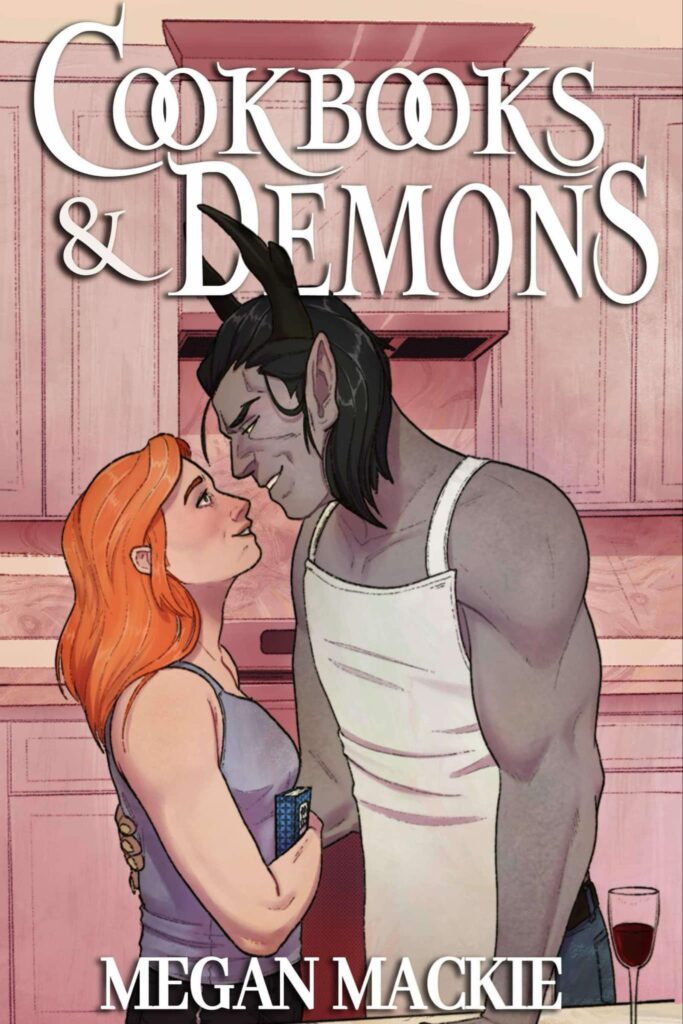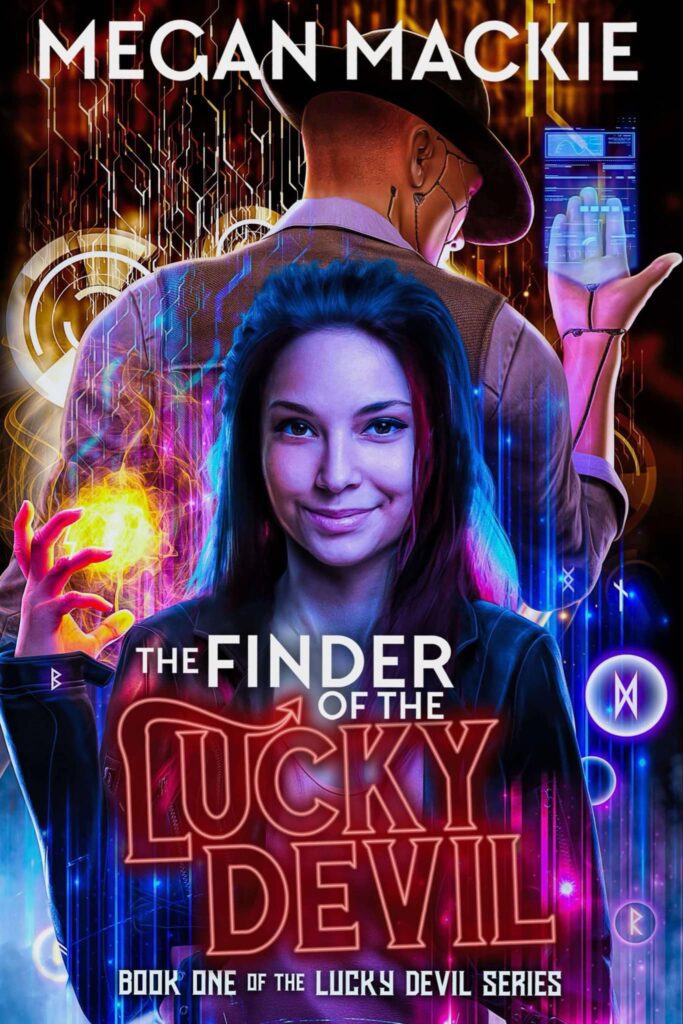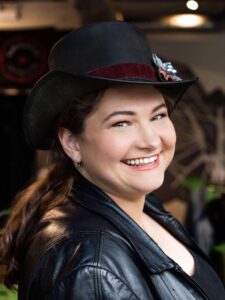
Creatives in Focus: Hey Megan how are you? How have the last few years of global pandemic insanity followed by return to some type of normal been treating you?
Megan Mackie: Haha. Honestly, the pandemic was one of those inflection pivot-like moments for me. It was when I went from writing in my spare time to being an author full time. Since then things have been interesting because I’ve had alternating years of success and then struggle, which friends have told me is all part of the creative career experience. But right now I feel like I’m swinging back up toward a good year.
CIF: Good to hear! It definitely has been strange. It didn’t affect me much, in the sense that I’ve worked at home for as long as I can remember, but my wife did decide to continue working from home once it ended. As an introvert I sometimes appreciated the slowest pace of life and ability to connect more with nature and my family. Of course I know many people who were very negatively affected and I empathize greatly. I also became way more productive with writing during that time.
MM: It was tough, I can’t lie. I have two special needs kids and remote learning was a nightmare for all of us. My husband has continued working from home and he loves it, but I do have to remind him to take himself out of the house once in awhile. LOL. By contrast, I am an extrovert, so the hardest part about covid and staying at home is I wasn’t regularly going to conventions like I had been, where I feed my social interaction animal.
CIF: I feel that. Homeschooling was a challenge for sure. As a semi-introvert I could deal with the rest. With that said, I’d like to talk about your writing but let’s start with a fun question. If you could have a drink with any author, living or dead, who would it be and why?
MM: Jane Austen, I would love to ask her about how she balanced writing her deep masterful social issues while feeding her audiences expectations of romance.
CIF: One of the few classic authors I’m ashamed of never having read. I should change that. For me I’d probably want to have a drink with James Joyce and Ernest Hemingway at a bar in Paris. Too many great stories of their drunken adventures and they are both massive influences on my writing.
MM: I’d love to find out from two legends of literary like that if they thought themselves frauds as well while they were doing their work.
CIF: I think self sabotage and imposter syndrome is just a common attribute of creatives. I’m sure both of their depression issues dealt a lot with feeling creatively inadequate and always wanting to do something better. There were about 20 years in between Joyce’s Ulysses and Finnegan’s Wake after all.
MM: ah the times when people didn’t expect an author to produce 3 to 4 books a year. I feel like my life is closer to Dickens actually with all his serial writing.
CIF: Let’s start at the beginning. When did you know you wanted to write professionally, and describe the journey that led to your first published novel?
MM: Well I wanted to be an actor first. I really tried but I couldn’t quite find my path through that jungle. I learned a lot about storytelling however and when I decided to take a break from pursuing acting, I focused on playwriting instead, which I had a knack for. But that also became a struggle to get people to understand my ideas and I only ever got one play put up, it was called The Princess Peach Conspiracy. I turned that into a podcast that is still floating out there in the world, but eventually the playwrighting helped me get really confident with my ability to do dialogue, build characters, and create arcs, so all I had to learn to fill in after that was the scenes and describe the acting choices those characters would take. My first book that I attempted was actually Silverblood Scion, which I only just published this year after a major overhaul. My first published book was The Finder of the Lucky Devil. I’ve since converted some of my plays into books, like The Vilification of Aqua Marine.
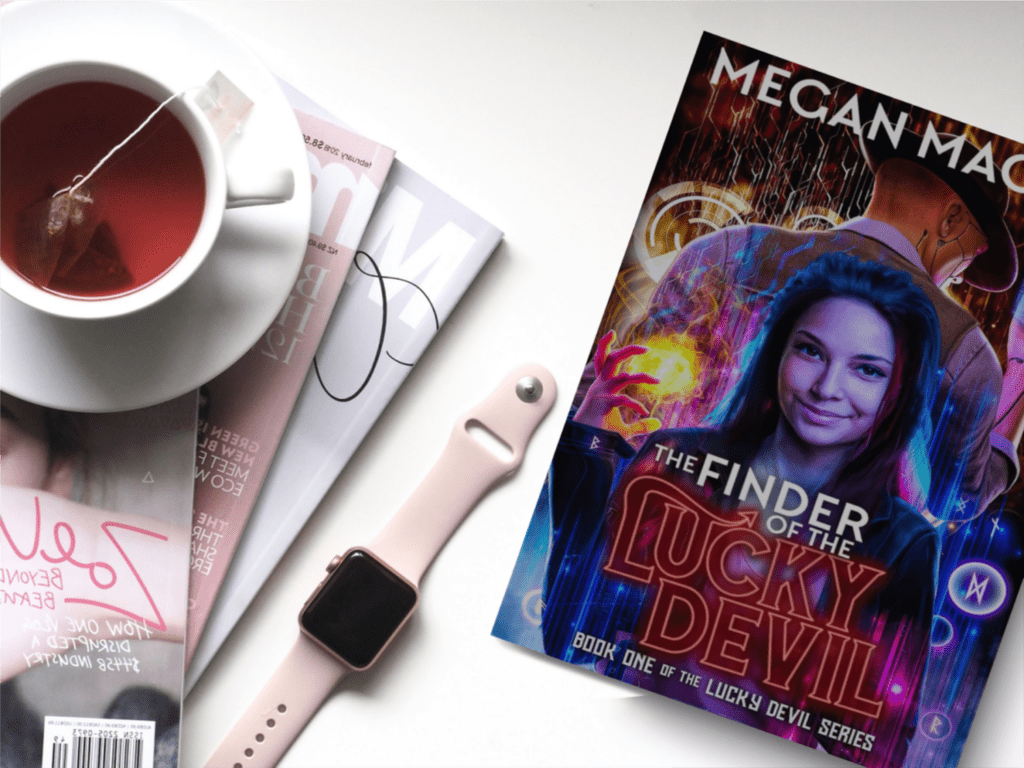
CIF: Tell our community about The Finder of The Lucky Devil and what makes it stand out from the rest. Why should it be everyone’s next purchase? Sell it!
MM: Well, my usual pitch goes as such: It takes place in an alternate Chicago where magic and technology are in economic competition with each other. We follow Rune Leveau, she had a magic Talent for finding things. She meets a cybernetically altered corporate spy who wants her to help him find a wanted criminal called Anna Masterson. The problem is she IS Anna Masterson.
To go into even more detail, it’s a world where magic has always existed and technology developed to try to compete with what magic can do. And it’s starting to surprass it which is disenfranchsing a whole load of magical beings. Corporations are taking over.
So I have a lot of “magical” creatures in mundane jobs, like there is a centaur who’s an actuary, a mermaid who’s a dog groomer, and even fairy bartenders.
CIF: Did you write it with a particular audience or market in mind or were you just writing what you enjoyed reading and hoping a readership would come along for the ride?
MM: I didn’t know anything specific about writing to market. What I ended up writing, and often is the impetus for my ideas, is either something I wanted to see in the genre I was reading or a cool idea that had a poor execution, mixed up in my brain with all the fairy tales, mythology, and the thousands of influences from movies and television that come out in my writing eventually and in surprising ways. Subverting expectations and twisting fairytales seem to by my forte, even if I don’t realize initially that I”m doing it. That’s where my acting training comes in, always looking for the most dramatic, enticing choices for my characters to take.
CIF: How much of yourself and the people in your personal life make it into your work? The reason I ask is I find I’m quite narcissistic as a writer and find that I write most of my male MCs as the me I wish I was and most female MCs as my wife as she actually is. Do you have any examples of this?
MM: Oh yeah, my male protagonists tend to be different aspects of my husband at any given time.
As of me, Rune would probably be the most like how I am, but that makes sense, she was my first protagonist, and it was with her I was learning. It might be partly why I take negative reviews about her a little harder because it’s difficult not to take those and judgements on me and the things I’ve had to learn about life that she learned at the same time as I was figuring them out. But all my characters have pieces of me in them. They have to since they come from me.
I have written a couple characters with aspects of people who have done me real harm, but that is my attempt to bring some light on that sort of behaviors in society.
CIF: Talk a bit about moving away from traditional publishing to embrace self publishing? Which did you prefer and what have you found to be the joys and challenges in each method?
MM: Well, we are living in the “wild west” of publishing right now and it’s tough. I initially tried the purely traditional route, querying my book to agents and the big 5, but they all rejected Finder. By the fiftieth rejection (and I’m aware that is a fairly low number) I decided it wasn’t up to them whether I was a real author or not, or even if my book was good or not, so I embarked on doing it myself. It was hard, because by the point I started, you couldn’t just put a book up on Amazon and it would just start selling, which was what happened in the 90s and 00s. The field had become too crowded already and the online companies were already working on closing those windows for success. It’s what drove me to learning how to do it for myself, going to cons and book fairs and promoting my work, one person at a time, one potential fan at a time. I remember the day that I sold my 100 copy of Finder was the day I finally heard back from one of the big 5 to tell me they wouldn’t be taking it because they didn’t see how it would sell. I had forgotten about them and had to laugh. I’ve since sold several thousand copies and there is still a bigger audience to reach. I’ve worked with other publishers, usually whenever I would hit a wall in my ability to grow, but often found they were doing the same things I was doing and less successfully but taking more of the cut. So at the moment, I’m completely independent and working on finally breaking through online. That doesn’t mean I won’t work with a publisher again, but I’ve definitely learned that I have to stop putting all my eggs in one basic, including my own.
CIF: How important is reader interaction to you as an indie author and what is your preferred method of networking with your readers?
MM: Reader interaction is the most important thing to me. It’s the thing I most treasure. I love people, even the ones I don’t like. I seek to understand and try to see the whole of them. So meeting my fans is the biggest thrill for me. People who recognize me for my work and want to talk to me as much as I want to talk to them is a life’s ambition for me. I look forward to the day when I go to a con or a book signing and the line goes out the door. I’ve had lines before, usually about three or four people at a time, and that is the best hour I get to spend is talking to people who read my work and got what I was going for, or what I was trying to say and I get to hear the response, the other side of the conversation, like a chess match I’ve been waiting months for the next move on. In person is best, but even the ones who pop up and message me through Facebook lighten my day, and tell me that what I’m doing is worth it and I’m on the right track. It spurs me on.
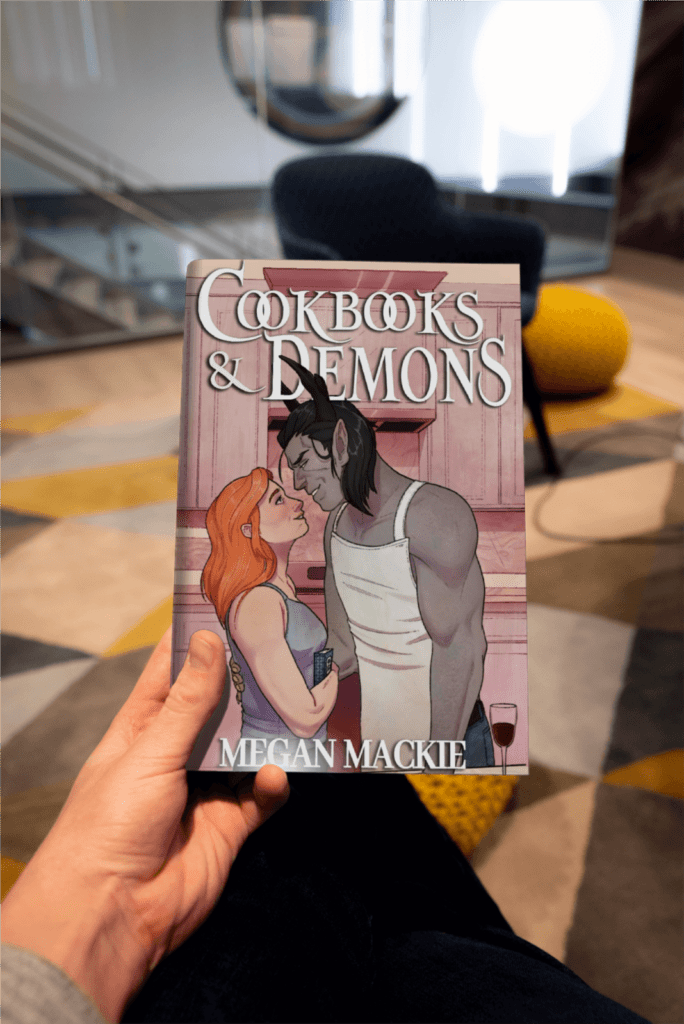
CIF: What takes up your time when not engaged in creative projects?
MM: Currently, it’s my house. We had some water damage back in September and it caused three floors of damage in my house so I’ve been learning the fine art of selecting tile and vinyl but if it’s for fun, I’m really into puzzles and games, jigsaw escape rooms, anything that can tickle or stretch my mind.
CIF: I’m particularly intrigued by another book of yours. Cookbooks and Demons. Can you talk about that one a bit?
MM: Cookbooks and Demons premise is very simple. It’s about a woman who doesn’t know how to cook and somehow summons a demon. It’s my take on a very cozy, sweet paranormal romance that does have some high stakes, but they’re inherent to being a demon. I really enjoyed writing the story. I did it for the yonder app, which was WEBTOON’s as novel Reading app which they’re now merging with Wattpad and I’ve since I’ve been able to publish it myself and it’s doing really well.
CIF: What one piece of advice can you extend to new and aspiring authors?
MM: Even if you were writing to market, you have to always put your own opinion your own perspective, your own purpose for writing the story into your work. It’s what makes you stand out from copycat. It’s why people read stories in the first place because they’re trying to make a connection with the ideas and thoughts that you may be having Without that it’s empty words. It’s part of why my other go to advice is always if you get stuck put it in brackets put what you’re trying to say in brackets because sometimes that is the idea of the opinion the thought that you’re actually trying to convey and you just need to get out of your own way and let it happen. It frees you up to actually talk to the reader sometime in the future when they read the book. It’s quite magical actually.
Purchase ‘Cookbooks & Demons’ on Amazon.
Purchase ‘The Finder of the Lucky Devil’ on Amazon.
